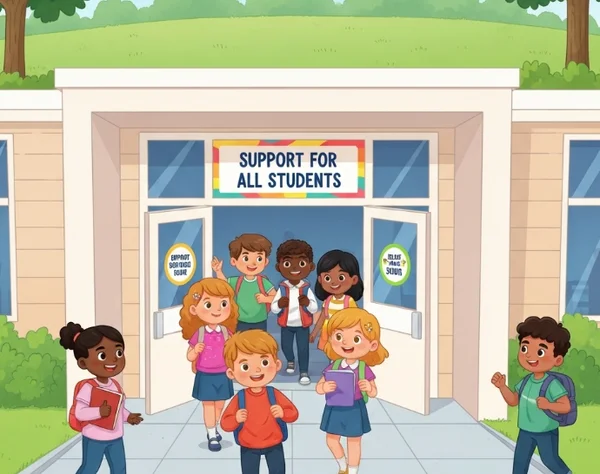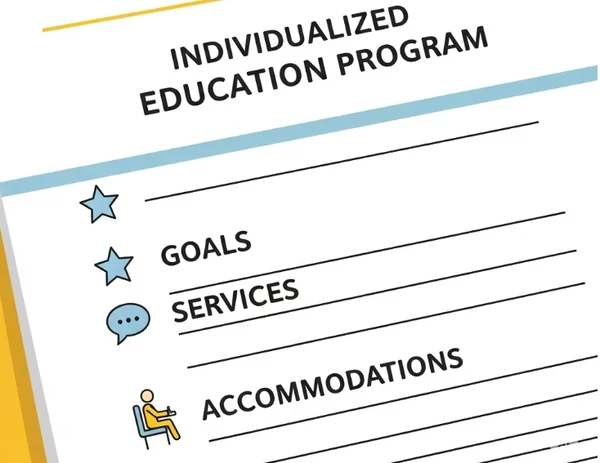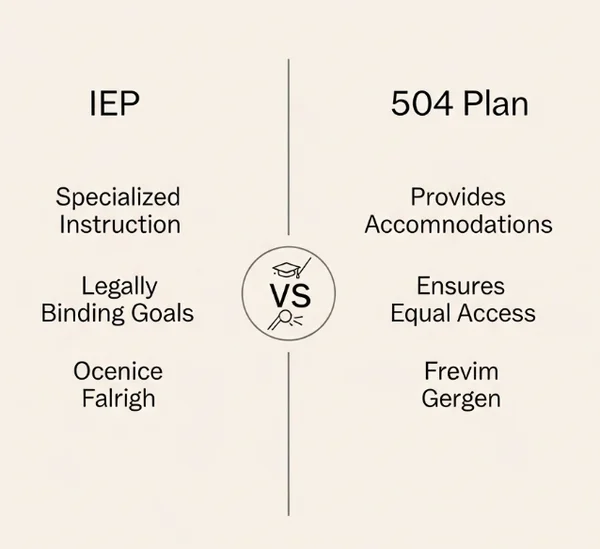Can Schools Test for Dyslexia? Your Guide to Support
Navigating School Dyslexia Support: Testing, IEPs & 504 Plans
When your child struggles with reading, you naturally look to their school for answers and support. A common question arises: Can schools test for dyslexia? Navigating the educational system to secure educational support can feel daunting. This guide will help you understand the school's role in dyslexia testing in school settings, explain Individualized Education Programs (IEPs) and 504 Plans, and empower you to advocate effectively for your child. Sometimes, understanding your child's learning profile through an initial online dyslexia test can be a helpful first step before engaging with the school.
Understanding the School's Role in Dyslexia Identification
What exactly is the school's role in dyslexia identification? Public schools in the United States have specific obligations under federal law.
Child Find Mandate: What It Means for Your Child
Under the Individuals with Disabilities Education Act (IDEA), schools have a Child Find mandate. This means they are legally required to identify, locate, and evaluate all children with disabilities who may be entitled to special education and related services. This includes students with specific learning disabilities, such as dyslexia. If you suspect your child has dyslexia, the school has a responsibility to consider an evaluation.
How Schools Typically Identify Students Needing Support
Schools often use a multi-tiered system of support (MTSS) or Response to Intervention (RTI) process to identify students needing help. If a child isn't making adequate progress with general classroom instruction and targeted interventions, the student support team (often including teachers, administrators, and specialists) may recommend a comprehensive evaluation to determine eligibility for special education services.

"Dyslexia Testing" in Schools vs. Clinical Diagnosis: Key Differences
It's important to understand that a school evaluation for dyslexia may not always result in a formal "dyslexia" diagnosis in the same way a clinical dyslexia diagnosis from a private psychologist would. Schools evaluate to determine if a student has a disability under one of IDEA's categories (often "Specific Learning Disability" for dyslexia) and if they need special education services. While they assess for characteristics of dyslexia, their primary goal is educational eligibility, not a medical diagnosis.
Requesting a School Dyslexia Assessment: The Process
If you believe your child needs a school dyslexia assessment, how do you start the process? Knowing how to make a request for an evaluation from the school is key.
Who Can Request an Evaluation and How to Do It
Parents, legal guardians, or school personnel can request an evaluation. It's best to make your request in writing to the school principal or special education director. Your dyslexia evaluation request letter should clearly state your concerns, provide specific examples of your child's difficulties, and formally request a comprehensive psycho-educational evaluation to determine eligibility for special education services.
What to Expect During the School Evaluation Process
The school psychological evaluation for dyslexia typically involves various assessments. These can include cognitive tests, academic achievement tests (reading, writing, math), classroom observations, and reviews of school records and parent/teacher input. The school's multidisciplinary team will conduct these evaluations.
Timelines and Your Rights as a Parent Under IDEA
IDEA provides specific timelines for school evaluations (usually 60 days from receiving parental consent, though state laws may vary). As a parent, you have significant parent rights in special education, including the right to consent to evaluations, receive copies of evaluation reports, and participate in all meetings regarding your child's education.
Understanding IEPs for Dyslexia: Individualized Education Programs
If the school evaluation determines your child is eligible for special education services, an IEP for dyslexia will be developed. But what is an IEP?
What is an IEP and Who Qualifies?
An IEP is a legally binding document that outlines the specific special education services, supports, and goals for a student with a disability. To qualify, a student must have one of the disabilities listed under IDEA (like a Specific Learning Disability, which often encompasses dyslexia) AND the disability must adversely affect their educational performance, requiring specialized instruction. IEP eligibility for dyslexia is determined by the evaluation team.

Key Components of an Effective IEP for Dyslexia (Goals, Services, Accommodations)
An effective IEP includes:
- Present levels of academic achievement and functional performance.
- Measurable annual IEP goals for dyslexia (e.g., improving decoding, reading fluency).
- Specific special education and related services (e.g., specialized reading instruction, speech therapy).
- Dyslexia accommodations for an IEP (e.g., extended time, use of assistive technology).
- How progress will be measured and reported.
Your Role in the IEP Meeting and Development Process
Parents are crucial members of the IEP team. Your IEP meeting parent input is vital. You have the right to participate in developing the IEP, share your insights about your child, and advocate for their needs. Don't hesitate to ask questions and ensure you understand and agree with the plan.
Exploring 504 Plans for Dyslexia: Ensuring Access and Accommodations
What if your child has dyslexia but doesn't qualify for an IEP? A 504 plan for dyslexia might be an option. What is a 504 plan and how can it help?
What is a 504 Plan and How Does It Differ from an IEP?
A 504 Plan comes from Section 504 of the Rehabilitation Act of 1973, a civil rights law. It ensures that students with disabilities have equal access to the educational environment. A key 504 vs. IEP dyslexia difference is that a 504 plan doesn't require specialized instruction, but it does require accommodations to level the playing field. A student may qualify for a 504 plan if they have a physical or mental impairment (like dyslexia) that substantially limits one or more major life activities (like reading).
Common Accommodations Under a 504 Plan for Students with Dyslexia
Common 504 accommodations for reading and other dyslexia-related challenges include:
-
Extended time on tests and assignments.
-
Preferential seating.
-
Use of assistive technology (e.g., audiobooks, text-to-speech).
-
Reduced homework load or modified assignments.
-
Note-taking assistance.

Advocating for a 504 Plan if Your Child Needs It
If your child doesn't qualify for an IEP but still needs support due to dyslexia, you can advocate for a 504 plan. You would typically request this through the school's 504 coordinator, providing documentation of your child's dyslexia (if available from an outside diagnosis or even insights from an online dyslexia test as supporting information for your concerns).
Collaborating with the School for Effective Educational Support
Securing an IEP or 504 plan is just the beginning. Ongoing collaboration with the school is essential for effective educational support. How can you work with the school effectively?
Building a Positive Relationship with Teachers and Support Staff
Foster open and respectful parent-teacher communication regarding dyslexia. View teachers and support staff as partners in your child's education. Share information, ask questions, and express appreciation for their efforts.
Regularly Monitoring Progress and Requesting Meetings
Stay informed about your child's progress. Review progress reports carefully. Don't hesitate to request meetings with the IEP or 504 team if you have concerns or if you feel the plan needs adjustments. Consistent follow-up is important.
What if the School Disagrees or Support Isn't Enough? (Dispute Resolution Options)
Sometimes, disagreements arise. IDEA provides special education dispute resolution options, such as mediation or due process hearings. Understanding your rights and these processes can be helpful if you feel your child's needs are not being met.

Partnering with Your School for Dyslexia Success
Navigating the school system to get the right support for a child with dyslexia can be challenging, but it's a journey you don't have to take alone. Public schools have systems in place, like dyslexia testing in school evaluations, IEPs, and 504 plans, to provide educational support. Your active involvement, understanding of your rights, and collaborative spirit are key to unlocking these resources.
Remember, an initial understanding of your child's potential risk through tools like an online dyslexia test can be a valuable conversation starter with the school. By partnering effectively, you can help ensure your child receives the support they need to succeed.
Do you have experiences navigating school support for dyslexia? Share your tips or questions in the comments below!
Frequently Asked Questions about School Dyslexia Testing and Support
Does the school have to use the word "dyslexia" in an IEP?
While schools are encouraged by federal guidance to use the term "dyslexia" in an IEP or evaluation reports if it's appropriate, they are not always strictly required to. Often, dyslexia is identified under the broader category of "Specific Learning Disability." What matters most is that the IEP accurately describes the child's needs and provides appropriate services, regardless of the specific label used.
How much does dyslexia testing by the school cost?
If a public school conducts an evaluation to determine eligibility for special education services under IDEA, this school dyslexia evaluation should be free of cost to parents. Free dyslexia testing in public schools is part of their Child Find obligation.
What if my child gets an IEP or 504 plan but is still struggling?
If your child has an IEP or 504 plan but continues to struggle, it's crucial to request a meeting with the school team. The IEP may not be working for dyslexia if goals are unmet or services are insufficient. The plan may need to be revised, accommodations adjusted, or different interventions tried. Continuous communication and advocacy are key.
Can an online dyslexia test result be shared with the school?
Yes, results from an online dyslexia test can be shared with the school as part of the information you provide when expressing your concerns. While an online screening is not a formal diagnosis, it can offer valuable preliminary data and support your request for a school-based evaluation. It can be a helpful tool for initiating a using a dyslexia screener for a school meeting.